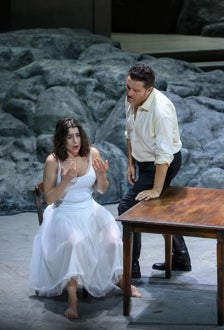Rusalka shines at the Liceu with Grigorian, Beczala and Pons at the helm

In the score for 'Rusalka,' Antonin Dvorak captures the lessons learned from a life spent exploring the beauty of sound based on the Central European classical tradition and the folkloric foundations of his native Bohemia and the few indigenous roots that remained in the country that welcomed him for a few years: the United States. We pay little attention to his music , exceptional in every genre, from the string quartet to the symphony, the symphonic poem, and, of course, opera. These days, we can see him at the Liceu in Barcelona .

- Music: A. Dvořák
- Performers: A. Grigorian, P. Beczala, O. Von der Damerau, K. Mattila. Lyceum Orchestra and Choir. C. Loy, scene. J. Pons, director.
- Date: June 25th.
- Place: Great Liceu Theatre, Barcelona.
In the most famous aria of this "Rusalka," he puts every voice and every instrument to work with a level of detail that allows us to perfectly capture this love for good music. While the soprano captivates the audience, the harp plays arpeggios with sixteenth notes, but they are always interrupted by a subtle pause. Meanwhile, the violins imitate her pizzicato, but with a certain delay: they have the pause at the beginning of the measure, not at the end, so that when the harp falls silent, the violins sound with a very similar yet distinct timbre. This is one of the devices with which Dvorak creates a sensation of undulation, of being submerged at the bottom of the sea with the enamored siren who is the protagonist of the drama.
If this can be said of just a few bars in a three-hour work, imagine what it must be like to have that entire score in your head to conduct it at the Liceu. Maestro Josep Pons concludes his long tenure as the house's principal conductor with this "Rusalka," which confirms what we've known for years: that he has taken the orchestra to levels that, when he arrived, we couldn't even imagine. His attention to detail is evident at every moment, combined with his theatrical flair, which allows him to create a solid, beautiful, and moving musical narrative. In short: making music, and good music at that.
Of course, to achieve this, it's also necessary to have a solid rapport both in the pit and on stage. And that's precisely where the strongest point of the production being seen these days at the Liceu lies. Asmik Grigorian is sublime as Rusalka, capable of handling both the most precious arias and the most devilish passages with impeccable skill. But it's Piotr Beczala who takes the cake with his prince. At 58 years old, his voice retains its beautiful timbre, and his technique allows him to shine as he pleases with every note. This, combined with the musical taste we've been celebrating for decades, consolidates him—if consolidation were ever needed—as one of the best tenors on the scene today. A commendable, flawless performance, with impressive brilliance when necessary and the most beautiful subtlety when required. The Barcelona audience remains at his feet, and it seems he's here for the long haul.
The rest of the cast was not in the least disappointing. Okka von der Damerau shone as the witch, which is greatly appreciated. She deserved to be part of a successful production after being one of the few redeeming features of the infamous "Lohengrin" we endured a few months ago. Alexandros Stavrakakis and Karita Mattila also excelled as Vodnik and the princess, respectively.
Regarding Christof Loy 's set design, there's little to comment on. It's the kind that would work equally well for a "Rusalka" as for The Marriage of Figaro, a Traviata, or a Flying Dutchman. The characters are dressed in well-stitched and sewn costumes, made from pretty patterns, with their stitching and finishing touches, but they're generally completely bland. It's true that it's not distracting, but it doesn't help the plot either . It's odd to talk so much about seas and forests when at no point do we leave a room in any old palace. It's as if the set designers had a single rule: anything goes, except doing what the script says we have to do. Sometimes it works, sometimes it doesn't, and sometimes it's boring. And in this case, we don't know if it's the second option, the third, or both at the same time. Coming from that production years ago at the Liceu, in which Rusalka was a prostitute who fell in love with a client, anything seems more or less worthy to us, but... will we ever see a Rusalka who is a mermaid? That would be absolutely innovative, a completely groundbreaking idea with the current landscape.
ABC.es





